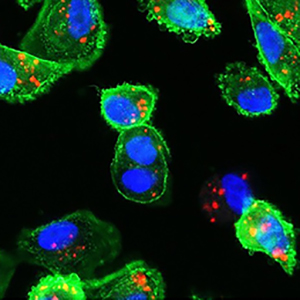Docetaxel-resistant triple-negative breast cancer cell-derived exosomal lncRNA LINC00667 reduces the chemosensitivity of breast cancer cells to docetaxel via targeting miR-200b-3p/Bcl-2 axis

Accepted: 29 September 2022
HTML: 26
All claims expressed in this article are solely those of the authors and do not necessarily represent those of their affiliated organizations, or those of the publisher, the editors and the reviewers. Any product that may be evaluated in this article or claim that may be made by its manufacturer is not guaranteed or endorsed by the publisher.
Authors
Development of docetaxel (TXT) resistance is a major obstacle for triple-negative breast cancer (TNBC) treatment. Additionally, chemoresistant cell-derived exosomes were able to change the chemo-response of chemosensitive recipient cells via transportation of lncRNAs. It has been shown that lncRNA LINC00667 level was significantly elevated in breast cancer tissues. Therefore, we explored whether LINC00667 level is increased in TXT-resistant TNBC cell-derived exosomes. In addition, whether exosomal LINC00667 derived from TXT-resistant TNBC cell could affect TXT sensitivity in TXT-sensitive TNBC cells was investigated as well. In the present study, exosomes were isolated from the TXT-resistant TNBC cells and from TXT-sensitive TNBC cells. Next, the level of LINC00667 in the isolated exosomes was detected with RT-qPCR. We found that LINC00667 expression was obviously elevated in TXT-resistant TNBC cell-derived exosomes compared to that in TXT-sensitive TNBC cell-derived exosomes. In addition, LINC00667 could be transferred from TXT-resistant TNBC cells to TNBC cells via exosomes. Moreover, TXT-resistant TNBC cell secreted exosomal LINC00667 markedly reduced the sensitivity of TNBC cells to TXT via upregulation of Bcl-2. Meanwhile, downregulation of LINC00667 notably enhanced the sensitivity of TXT-resistant TNBC cells to TXT through downregulation of Bcl-2. Additionally, LINC00667 was considered to be a ceRNA to sponge miR-200b-3p, thereby elevating Bcl-2 expression. Collectively, TXT-resistant TNBC cell-derived exosomal LINC00667 could decrease the chemosensitivity of TNBC cells to TXT via regulating miR-200b-3p/Bcl-2 axis. These findings suggested that LINC00667 might serve as a promising target for enhancing sensitivity of TNBC cells to TXT therapy.
Ethics Approval
This study was approved by the Ethics Committee of Institute of Fudan-Minhang Academic Health System, Minhang Hospital, Fudan UniversitySupporting Agencies
Medical Teaching Research Collaborative Health Service System in Minhang District , Shanghai Municipal Health CommissionHow to Cite

This work is licensed under a Creative Commons Attribution-NonCommercial 4.0 International License.
PAGEPress has chosen to apply the Creative Commons Attribution NonCommercial 4.0 International License (CC BY-NC 4.0) to all manuscripts to be published.

 https://doi.org/10.4081/ejh.2022.3529
https://doi.org/10.4081/ejh.2022.3529






